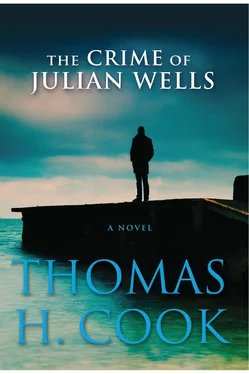Thomas Cook - The Crime of Julian Wells
Здесь есть возможность читать онлайн «Thomas Cook - The Crime of Julian Wells» весь текст электронной книги совершенно бесплатно (целиком полную версию без сокращений). В некоторых случаях можно слушать аудио, скачать через торрент в формате fb2 и присутствует краткое содержание. Год выпуска: 2012, ISBN: 2012, Издательство: Grove Press, Жанр: Криминальный детектив, на английском языке. Описание произведения, (предисловие) а так же отзывы посетителей доступны на портале библиотеки ЛибКат.
- Название:The Crime of Julian Wells
- Автор:
- Издательство:Grove Press
- Жанр:
- Год:2012
- ISBN:9780802194589
- Рейтинг книги:5 / 5. Голосов: 1
-
Избранное:Добавить в избранное
- Отзывы:
-
Ваша оценка:
- 100
- 1
- 2
- 3
- 4
- 5
The Crime of Julian Wells: краткое содержание, описание и аннотация
Предлагаем к чтению аннотацию, описание, краткое содержание или предисловие (зависит от того, что написал сам автор книги «The Crime of Julian Wells»). Если вы не нашли необходимую информацию о книге — напишите в комментариях, мы постараемся отыскать её.
The Crime of Julian Wells — читать онлайн бесплатно полную книгу (весь текст) целиком
Ниже представлен текст книги, разбитый по страницам. Система сохранения места последней прочитанной страницы, позволяет с удобством читать онлайн бесплатно книгу «The Crime of Julian Wells», без необходимости каждый раз заново искать на чём Вы остановились. Поставьте закладку, и сможете в любой момент перейти на страницу, на которой закончили чтение.
Интервал:
Закладка:
True to his word, he subsequently made all the plans necessary to get Loretta and me to Rostov-on-Don, which, despite its rustic name, turned out to be a bustling city of more than a million.
At the airport, Yuri whisked us off to a surprisingly modern hotel, where we treated him to dinner. Loretta struck up a curiously intense interrogation that began with Yuri’s first meeting with Julian, progressed through Julian’s research, and moved rapidly until she reached her intended point.
“Do you remember Julian meeting a man named Mikhail Soborov?” Loretta asked. “He lives here in Rostov, I believe.”
“Yes, I went with him to this man,” Yuri answered in an English that became more offbeat by the minute. “At first beginning they are trying to speak Spanish, but the old man, he was no longer to speak it.” His smile betrayed a carefully honed cleverness. “I never have expect that Julian to look for such a one as Mikhail Soborov.”
“Such a one?” Loretta asked.
“Old-time KGB,” Dimitri answered.
“What did they talk about?” Loretta asked.
“I don’t know,” Dimitri said. “They will not talk in front of me. Once Julian, he is said something in Spanish, and the old man, he is getting up and push me out of the room and close the door.”
Why? I wondered, but there was no point in asking, since the conversation moved to other topics until the meal came to an end.
But the notion of Julian having some secret conversation with a Russian agent continued to trouble me, and later that night, tossing sleeplessly in my bed, I decided to take a walk.
Outside the hotel, the charmless streets of Rostov swept outward toward the distant Don, a river that did indeed, as Sholokhov said in the title of his famous novel, flow quietly to the sea.
It was mostly a cheerless place, architecturally boring, yet its streets had been walked by an extraordinary number of Russia’s great literary figures. Pushkin had a boulevard named after him; Chekhov and Solzhenitsyn had also spent time in Rostov; and a young Gorky had worked on its docks. A city with such rich literary history appealed to me, of course, but I saw little evidence that it had done the same for Julian. In The Commissar, he had painted it as a warren of all but indistinguishable streets, a gray labyrinth fed by a gray stream, through which Chikatilo, “the Red Ripper,” had made his way like a blind horse, sensing corners, alleys, and dead ends, and always, always, the presence of a waylaid child.
It was the route of this devouring monster that Julian had relentlessly followed. He had written of Chikatilo’s birth in the tiny village of Yablochnoye, a little boy whose mother had filled his mind with tales of the Great Famine, including the hideous story that Chikatilo’s own brother had been kidnapped and eaten by neighbors. Meticulously, Julian had detailed the emergence of this wounded boy into a biologically complete but inwardly crippled adult, a man who married and became the father of two children by the time he took a teaching job in Novoshakhtinsk, the one from which he was later dismissed amid charges of child molestation.
Julian had spent time in both those places, as was clear from The Commissar, but it was in Shakhty (Russian for “mine shaft,” as Julian pointed out) that he had stayed the longest, as if attempting to unearth what it was about this grim little town that finally tempted Chikatilo to commit his first murder.
She was only nine years old, and Chikatilo lured her to an old house that he’d bought for the purpose; thus it was a crime, as Julian wrote in one of his stark phrases, “as premeditated by his reason as it was preordained by his madness.”
It was the blood of this child that Chikatilo’s wife found in the snow in front of her own house and that generated the suspicions she would harbor for decades, little noises that continually sounded like a footfall outside her window.
But loyal wife that she was, Fayina kept her silence as the years passed and the body count rose in towns and villages along railway lines, riverbanks, and the many forests of the Don.
It was here, in Rostov, that Chikatilo had killed two women in Aviator Park, then gone on to kill again in Novoshakhtinsk and from there back to Shakhty, then back to Rostov, where yet another body was found in Aviator Park.
Julian had pointed out Andrei Chikatilo’s extraordinary recklessness, the careless abandon with which he murdered, the public arenas that were both his killing fields and his dumping grounds, as if he had come to believe, as all madmen do, that he was in league with the sun and the moon, protected by the elements themselves, shrouded by fog and veiled by rain, perhaps feeling the added pleasure of believing that in all the world he would be the last person suspected of his crimes.
In fact, Chikatilo’s only precaution, though Julian came to doubt that even this was a conscious act of evasion, was that he’d finally begun to enlarge the murderous circle that had earlier enclosed him, killing outside Moscow, then in Revda, Zaporizhya, Krasny Sulin, and as far afield as Leningrad.
Julian had visited every murder site, his book made clear, but it was here, in Rostov, that he’d lived during most of his time in Russia, and it was here that he’d written a good deal of it while holed up in a small apartment off Ulyanovskaya Street.
I knew the address because I’d written him many e-mails, encouraging him in his research and subject matter, always adding that one day I thought his accomplishment would be clear. I never knew how he received my encouragement because he never once responded to it. Rather, his next communication would detail some new idiom he’d learned or some new author, usually Russian, whom he’d discovered.
Late in the evening I came to the little street where Julian had lived for many years. It was quite dark by then, but Rostov’s reliable street lamps offered sufficient light for me to see the windows on the third floor. How many times Julian must have stood at those windows, I thought, stood and stared cheerlessly out over this deeply foreign city.
The expatriate is well established in literature, of course, but usually the portrayal is romantic-Lord Byron in Italy, for example. One sees the desolate exile less often, and yet when I considered Julian’s time in Rostov, I thought of Ovid’s banishment to bleak, impoverished Tomis. “My punishment,” love’s great poet wrote, “is the place.” It was unimaginable to me that Rostov and Shakhty and Revda had not been similar punishments for Julian, and had I begun to write about him when I returned to my room later that night, I would certainly have made some comparison between his life in Rostov and Ovid’s in Tomis, how isolated Julian must have felt in Russia, and how incalculably alone. The difference was that Julian’s exile was shy;self-imposed-thus another sign that he had inflicted some strange punishment upon himself by living in desolate places and filling his mind with torture and murder, by choosing as his sole companions the great demons of the world. In that way, too, I supposed, he wasn’t just a good man, but a great one, not just an artist, but one whose art had imposed exile and solitude. Ovid had been forced to live in dreadful Tomis, after all, while Julian, at least, had chosen it.
I said this to Loretta the next morning, and in response she glanced out over the spare little dining room our hotel provided, most of the tables occupied, the air filled with the soft Slavic murmur of the other guests.
“This must have been the loneliest place Julian ever lived,” she said. “With no one who spoke English. Or any other language he knew.”
At Loretta’s mention of Julian’s languages, I found myself thinking of the first one he’d learned, Spanish, then of the first country in which he had encountered it.
Читать дальшеИнтервал:
Закладка:
Похожие книги на «The Crime of Julian Wells»
Представляем Вашему вниманию похожие книги на «The Crime of Julian Wells» списком для выбора. Мы отобрали схожую по названию и смыслу литературу в надежде предоставить читателям больше вариантов отыскать новые, интересные, ещё непрочитанные произведения.
Обсуждение, отзывы о книге «The Crime of Julian Wells» и просто собственные мнения читателей. Оставьте ваши комментарии, напишите, что Вы думаете о произведении, его смысле или главных героях. Укажите что конкретно понравилось, а что нет, и почему Вы так считаете.












